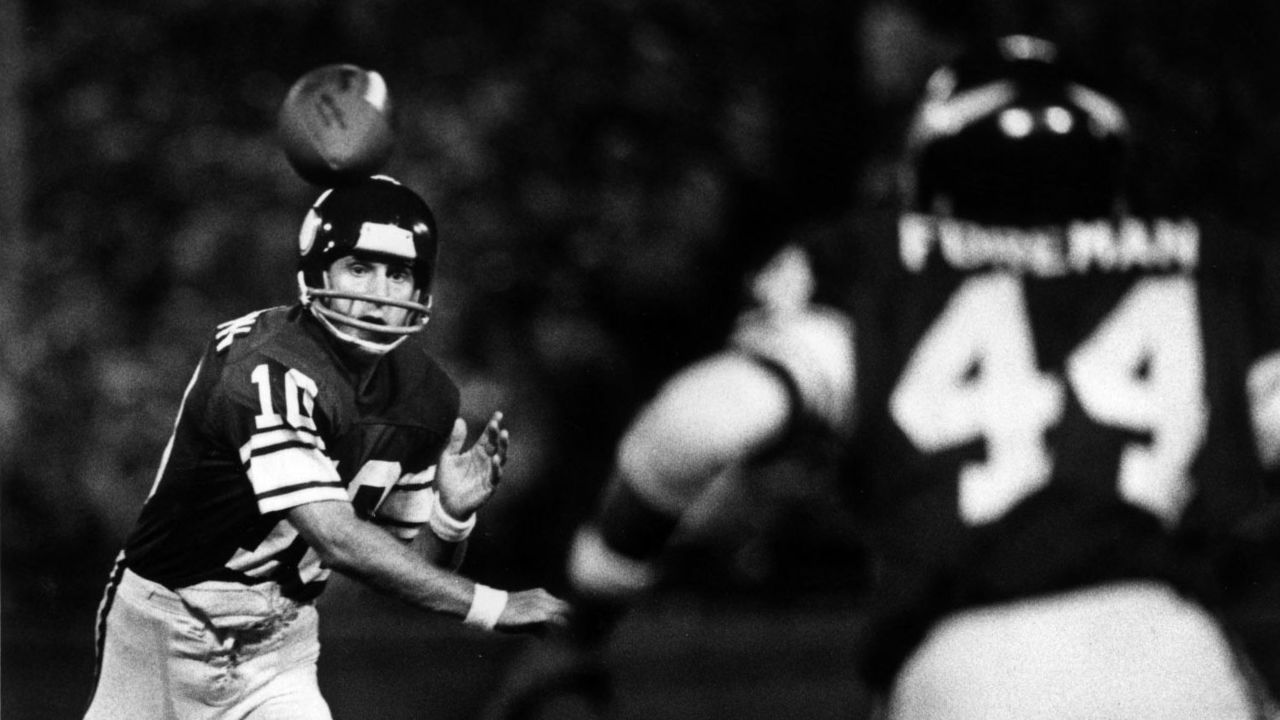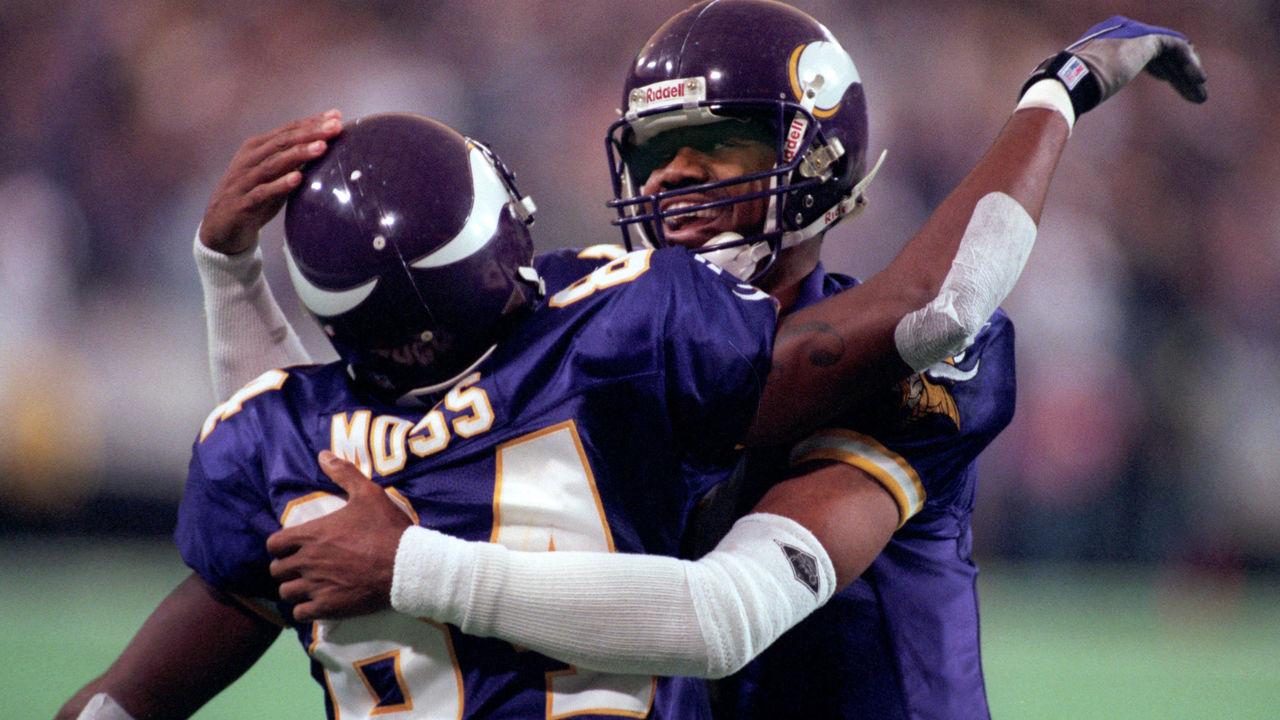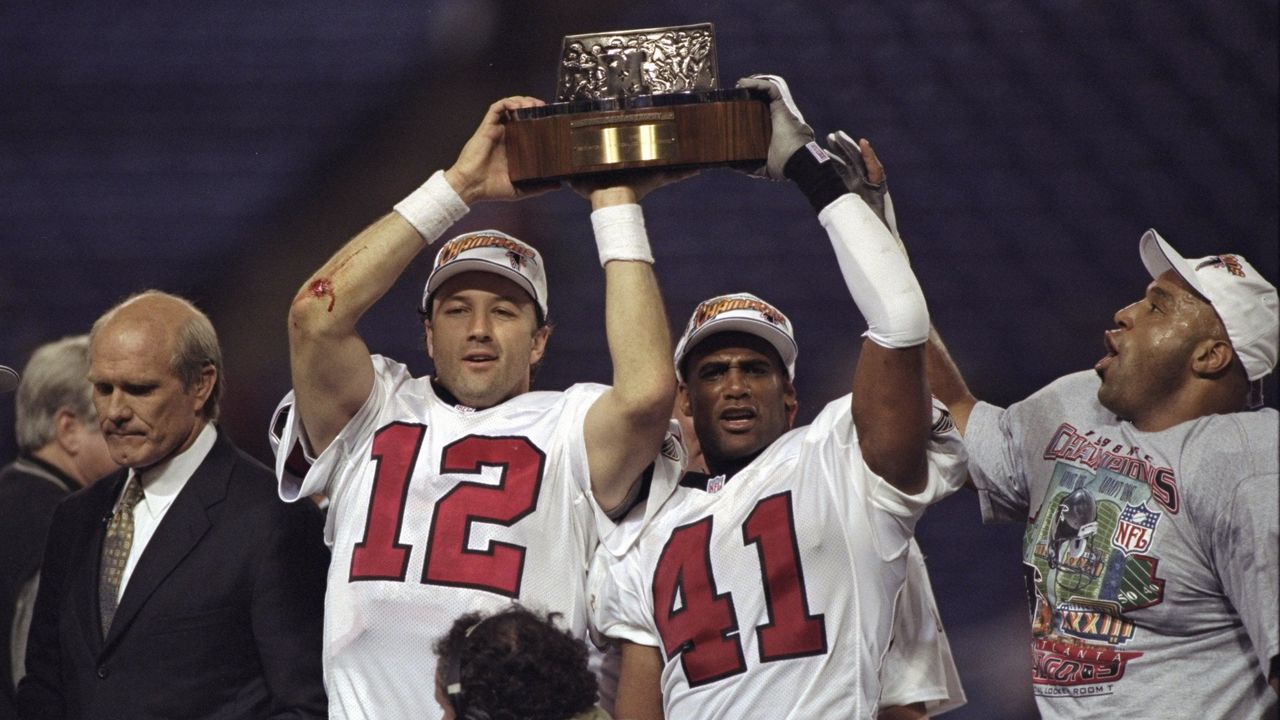Almost Famous: 1998 Vikings were an inexplicable disappointment
Sports history is littered with great teams that dominated their regular seasons only to fall short of ultimate glory in the playoffs. Our writers are paying tribute to those teams who were Almost Famous. After tackling MLB and the NHL, the NFL is up next.
There's no point in arguing which NFL team is the greatest to never win a championship. The answer is the 2007 New England Patriots, who went 16-0, hold the record for regular-season point differential, and remain second-best all time in Football Outsiders' DVOA efficiency rating. But the Pats lost to Eli Manning and the New York Giants in Super Bowl XLII, and that's that.
Still, there's something about reaching a Super Bowl that validates a team, even in defeat. So when I considered the right squad to choose for this assignment, I found myself drawn to the great ones that romped through the regular season but didn't get to the Super Bowl. There are a bunch: the 1973 Rams, 1976 Steelers, 1979 Chargers, 1986 Browns, 1987 49ers, 1992 49ers, 2004 Steelers, 2005 Colts, 2011 Packers. You might even be able to think of a handful I didn't mention, and that's fine. Go ahead and drop your suggestions in the comments; while you're down there, feel free to call me a nimrod.
But the team that just might be the most fascinating is the 1998 Minnesota Vikings - and not just because of the heart-wrenching season they had.
The Vikes are one of the NFL's most genuinely frustrating franchises. They're frequently very good, but never good enough. Minnesota consistently gets to the postseason; since the 1970 merger, only the Steelers, Cowboys, Patriots, and 49ers have appeared in more playoff games. But those other four franchises have combined to win 22 Super Bowls, while the Vikings have won zero. Minnesota is 0-4 in the Super Bowl, with all four losses coming in an eight-season span from 1969-1976; it hasn't been back since. The Vikings have reached the NFC title game six times since 1976, but they've lost all six. You get the idea.

The 1998 Vikings had a plus-260 point differential, which still ranks as the seventh-best in NFL history. The six teams in front of them all reached the championship game, whether it was the Super Bowl or the equivalent AFL or NFL title game. That 1998 Vikings season really was the cruelest tease of all.
The 1998 Vikings captured something unusually special. Minnesota went 15-1 and set what was then a league record for points scored in the regular season (556). The Vikes were primed to waltz into Super Bowl XXXIII; they were 11-point favorites in the NFC Championship Game at home against the Atlanta Falcons, who had gone 14-2. And then, owing to a variety of ill-timed mistakes and missed opportunities, the Vikes blew a 13-point lead, and it was all over.
Minnesota had entered that season with reasons for optimism. It was already a well-balanced team that had won a playoff game the season before. But on draft day, the Vikings landed wideout Randy Moss with the 21st overall pick. Moss would become a Hall of Famer, but the breadth of his talent was immediately evident upon his arrival.
"Moss' performances that spring and summer," Sports Illustrated's Conor Orr wrote two years ago, "became something like the origin scenes in a superhero comic book."
At 6-foot-4, 210 pounds, Moss had great size, but he was also gifted with extraordinary speed and body control. Orr's piece touches on how many of his teammates were in awe of his ability right away, with quarterback Brad Johnson describing more than once how it was pretty much impossible to overthrow him. The Vikes already had another future Hall of Fame receiver in Cris Carter. They would quickly discover just how lethal all that speed and skill could be. As offensive coordinator (and future Baltimore Ravens head coach) Brian Billick told Orr:
"We almost got to the point where we stopped looking at film. You try and prepare the players and say, 'OK, this is what teams usually did, they're single high or three deep' or whatever. So we'd come into the game and it would be totally different. They figured they'd have to try something. So we'd just get into the game and adjust to whatever they were doing. Looking at all that film was a waste of time."

Moss debuted by catching touchdown passes covering 48 and 31 yards in a 31-7 rout of the Buccaneers. Johnson broke his ankle the following week, and his replacement was Randall Cunningham, the thrilling former dual-threat Philadelphia Eagles star who was out of the league in 1996 and came back to join the Vikings a year later. By 1998, Cunningham was 35. With so many weapons at his disposal - including running back Robert Smith and tight ends Andrew Glover and Matthew Hatchette - Cunningham immediately settled in to become the kind of pocket passer his fiercest critics assumed he never could be. And the Vikings were off.
They won their first seven games - without scoring fewer than 29 points - before finally losing in Week 9 at Tampa Bay. Their big showcase came Thanksgiving Day in Dallas, on national television, when Moss caught TDs of 51 and 56 yards around a 54-yard TD catch for Carter - all in the first quarter. Moss finished the game with three catches for 163 yards ... and three touchdowns.
The first two TD catches came on slightly underthrown balls that Moss casually caught on his hip in stride. The third, seen below, showed off his dazzling speed and footwork. He also caught a two-point conversion pass. It almost didn't seem fair.
The Vikings followed that win over the Cowboys by hanging 48 points on the Chicago Bears, 38 on the Baltimore Ravens, and 50 against the Jacksonville Jaguars. They finished as just the third team to win 15 regular-season games; the first two - the 1984 49ers and the 1985 Bears - had won the Super Bowl.
Minnesota's first playoff game was more of the same: an easy 41-21 takedown of the Arizona Cardinals. The upstart Falcons weren't given much of a chance when they came to the old Metrodome a week later with a berth in the Super Bowl hanging in the balance. Early on, at least, it looked like the Vikings might glide right past them.
After the Falcons scored a first-possession touchdown, the Vikings stormed back to a 17-7 lead, with Cunningham taking three straight deep shots downfield to Moss. Atlanta was called for back-to-back 15-yard penalties that set the Vikings up at the Falcons' 19-yard line with a shot to blow the game wide open before halftime. Then, on first down, this happened:
It was a rare drop for Moss, who appeared to slow down a bit just before the ball arrived, which forced him to break stride to reach for it. The play seemed insignificant at the time, as the Vikings soon settled for a field goal to extend their lead to 20-7. But it was indicative of the mistakes that doomed Minnesota as the game proceeded.
One observation from rewatching that game: Billick was not afraid to get Moss the ball any way he could, even by using the deception and misdirection that has become much more common in today's wide-open game. Check out this orbit motion combined with play-action to free up Moss for a swing pass that he turned into a decent gain:
Much of what the Vikings did that day involved little pre-snap motion, however, with Cunningham frequently working under center. Additionally, after those three straight early deep shots to Moss, Cunningham largely threw underneath; a graphic shown during the broadcast just before the start of the second half indicated that he had attempted just five first-half passes of 15 yards or more. One was Moss' end-zone drop.
Late in the first half, Cunningham fumbled after his arm was hit by Falcons defensive end Chuck Smith as he wound up to throw. Atlanta took over at the Vikings' 14 with 59 seconds left until halftime. The Falcons scored on the next play to make the halftime score 20-14.
The Vikings compiled a 15-play, seven-minute drive into the fourth quarter to extend their lead to 27-17. But Moss had another drop, and center Jeff Christy failed to get a snap up into Cunningham's hands, resulting in another lost fumble. Still, after a fourth-down stop, the Vikings largely relied on Smith to pound out a drive that ended with the game's defining gaffe.
Place-kicker Gary Anderson had been perfect all year: 35-for-35 on field goals, 59-for-59 on extra points. But with 2:10 left and a chance to put the Vikings up again by 10, Anderson sailed his kick wide left. The Falcons marched back up the field in eight plays to tie the game with 49 seconds to go.
The Vikings had another opportunity in regulation, but Cunningham misfired on a deep ball to Moss on second down. Dennis Green then elected to take a knee on third down from the Vikings' own 27 rather than risk a disaster like the one that happened at the end of the first half. The crowd booed lustily. One of the greatest offenses in NFL history was denied its biggest chance by its own head coach.

The Vikings got the ball first in OT, and both teams possessed the ball twice before the Falcons won it on a field goal. The heartbroken silence in the Metrodome was obvious on the broadcast; it was apparently worse in the locker room. Smith told Orr there were "NFC Champions" banners and other premature displays all over the place, which only added insult to injury.
The Vikings got back to the playoffs the next two seasons, and even reached the NFC title game again in 2000, only to get throttled by the Giants. But 1998 is the loss that lingers. Unlike the Patriots, who've won three championships and reached five Super Bowls since their big 2007 letdown, that 1998 team stands as a symbol of the Vikings' longstanding history of almost getting it done. They were a unique team at the right time that wowed the football world for an entire season, and then they were gone.
Dom Cosentino is a senior features writer at theScore.